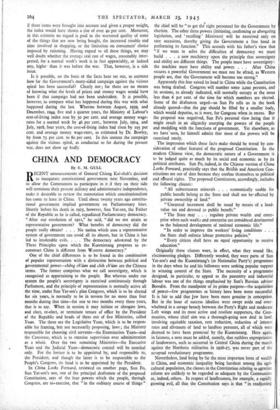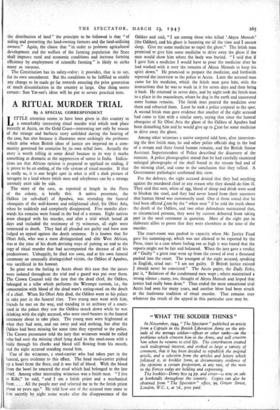CHINA AND DEMOCRACY
By E. M. GULL
One of the chief differences is to be found in the combination of popular representation with a distinction between political and governmental power—ehing ch'iiarz and chits ch'iian are the Chinese terms. The former comprises what we call sovereignty, which is recognised as appertaining to the people. But whereas under our system the people's sovereignty is exercised continuously through Parliament, and the principle of representation is normally active all the time, under Sun Yat-sen's plan Congress, which- is to be elected for six years, is normally to be in session for no more than four
months during that time—for one to two months every three years, that is to say. When in session it may initiate or abrogate laws, and elect, re-elect, or terminate tenure of office by the President of the Republic and heads of three out of five Ministries, called Yuan. The three are the Legislative Yuan, which is to be respon- sible for framing, btit not necessarily proposing, laws ; the Ministry responsible for choosing civil servants—the Examination Yuan—and the Censorate, which is to exercise supervision over administration as a whole. Over the two remaining Ministries—the Executive Yuan and the Judicial Yuan—democratic control will be nomihal only. For the former is to be appointed by, and responsible to, the President, and though the latter is to be responsible to the People's Congress, its head is to be appointed by the President.
In China Looks Forward, reviewed on another page, Sun Fo, Sun Yat-sen's son, one of the principal draftsmen of the proposed Constitution, says of the four powers which the people, through Congress, are to. exercise, that "in the ordinary course of things"
the chief will be "to get the. right personnel for the Government by election. The other three powers (initiating, confirming or abrogating legislation, and ' recalling ' Ministers) will be exercised only on rare occasions, thereby giving the Government a free hand in performing its function." This accords with his father's view that "if we want to solve the difficulties of democracy we must build . . . a new machinery upon the principle that sovereignty and ability are different things. The people must have sovereignty: the machine must have ability and power. . . . After China secures a powerful Government we must not be afraid, as Western people are, that the Government will become too strong."
Apparently this fear raised its head in China while the Constitution was being drafted. Congress will number some 2,000 persons, and its sessions, as already indicated, will normally occupy at the most less than 6 per cent, of the time for which members are elected. Some of the draftsmen urged—so Sun Fo tells us in the book already quoted—that the gap should be filled by a smaller body, which would deputise, as it were, for Congress when in recess. But the proposal was negatived, Sun Fo's personal view .being that it might result in an oligarchy usurping the powers of the people and meddling with the functions of government. Yet elsewhere, as we have seen, he himself admits that most of the powers will be exercised rarely.
The impression which these facts make should be tested by con- sideration of other featurei of the proposed Constitution. In the modern Chinese view, the democratic nature of a Government is to be judged quite as much by its social and economic as by its political attributes. Sun Fo, indeed, in the Chinese version of China Looks Forward, practically says that the British and American Con- stitutions are out of date because they confine themselves to political and natural rights. The proposed Constitution, accordingly, includes the following clauses : "All subterranean minerals . . . economically usable for public benefit belong to the State and shall not be affected by private ownership of land."
"Unearned increment shall be taxed by means of a land- value tax and devoted to public benefit."
"The State may . . . regulate private wealth and enter- prise when such wealth and enterprise are considered detrimental to the balanced development of national economic life."
"In order to improve the workers' living conditions . . . the State shall enforce labour protective policies."
"Every citizen shall have an equal opportunity to receive education."
Originally these clauses were, in effect, what they sound like, electioneering pledges. Differently worded, they were parts of Sun Yat-sen's and the Kuomintang's (or Nationalist Party's) programme in the days when he and his followers were seeking popular support in winning control of the State. The necessity of a programme designed, in particular, to appeal to the peasantry and industrial labour was one of the things emphasised by Sun's Russian adviser Borodin. From the standpoint of its prime purpose—the acquisition of power—few programmes in history have been more successful. It is fair to add that few have been more genuine in conception. But in the hour of success idealists were swept aside and over- whelmed in a savage breach between the Party's Right and moderate Left wings and its most active and resolute supporters, the Com- munists, whose chief aim was a thorough-going new deal in land, involving equitable taxation, rent reduction, reduction of interest rates and allotment of land to landless peasants, all of which were deemed to have been promised by the Kuomintang. Here again, in fairness, a note must be added, namely, that ruthless expropriation of landowners, such as occurred in Central China during the march against the Northern militarists in 1926-27, was never part of the accepted revolutionary programme.
Nevertheless, land being by far the most important form of wealth in China, and economic inequality being harshest among the agri- cultural population, the clauses in the Constitution relating to agrarian reform are unlikely to be regarded as adequate by the Communists or, indeed, others. In respect of landlessness, for example, a rapidly growing evil, all that the Constitution says is that "in readjusting
the distribution of land" the principle to be followed is that "of aiding and protecting the land-owning farmers and the land-utilising owners." Again, the clause that "in order to prdmote agricultural development and the welfare of the farming population the State shall improve rural and economic conditions and increase farming efficiency by employment of scientific farming" is likely to strike many as vacuous.
The Constitution has its safety-valve: it provides, that is to say, for its own amendment. But the conditions to be fulfilled to enable any change to be made go far towards ensuring the prior generation of much dissatisfaction in the country at large. One thing seems certain: Sun Yat-sen's ideas will be put to severe practical tests.



























 Previous page
Previous page